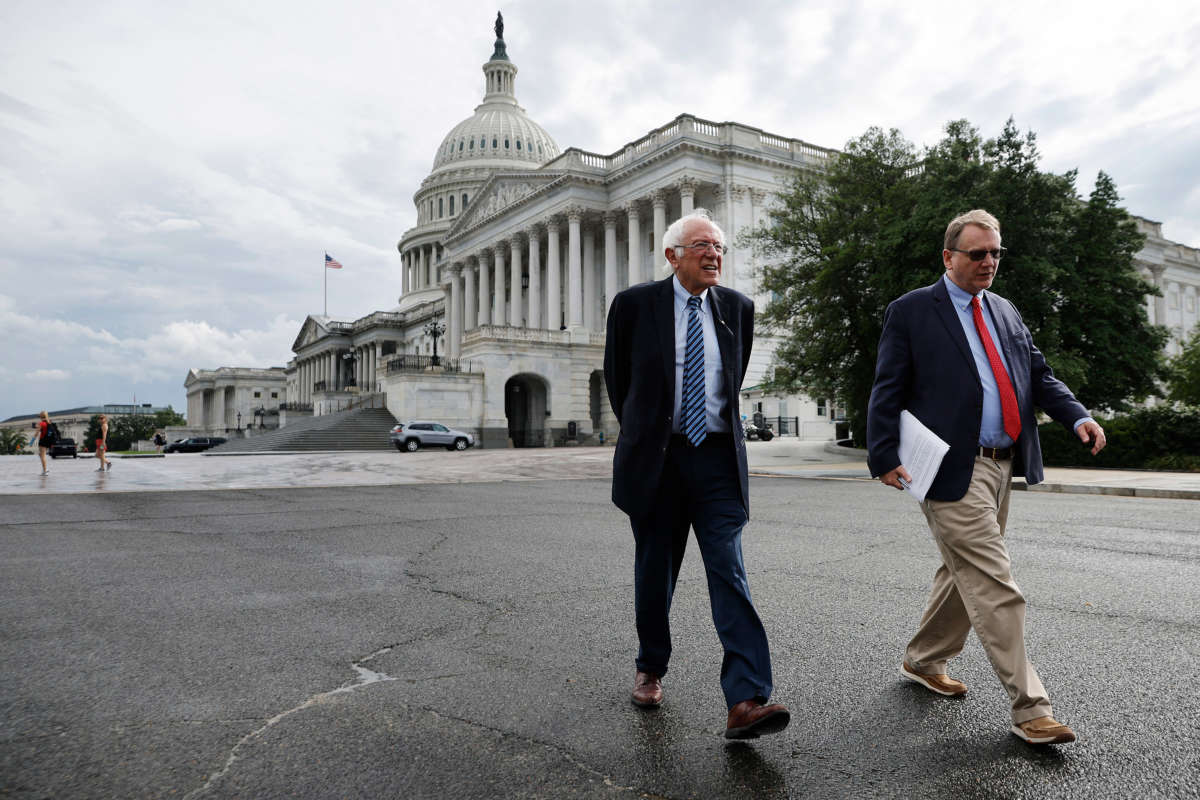Support justice-driven, accurate and transparent news — make a quick donation to Truthout today!
On Wednesday, Sen. Bernie Sanders (I-Vermont) announced that he is planning to file amendments to the Inflation Reduction Act (IRA) in order to remedy certain concessions in the bill that top Democrats tailored to please corporate-friendly Sen. Joe Manchin (D-West Virginia).
In a speech on the Senate floor, the Vermont progressive announced that he is planning to take aim at the IRA’s giveaways to the fossil fuel industry that would make it harder to fight the climate crisis. He’s also planning to file an amendment to expand Medicare and allow it to access the same prices for prescription drugs as the Department of Veterans Affairs (VA), which would cut prices for hundreds of drugs roughly in half.
“In my view, we have to do everything possible to take on the greed of the fossil fuel industry, not give billions of dollars in corporate welfare to an industry that has been actively destroying our planet. I will be introducing an amendment to do just that,” Sanders said, quoting climate advocates who have called the bill a “climate suicide pact.” Instead of giving subsidies to the fossil fuel industry, he said, Congress should be focusing on ending such handouts altogether.
Allowing Medicare to access lower drug prices has the dual effect of saving the agency $900 billion over the next decade while funding his initiative to expand Medicare to coverage vision, dental and hearing and lowering the eligibility age to 60 or lower, he added.
Sanders has been one of the most outspoken Democrats in Congress in his criticisms of the bill. He has had limited praise for some of the bill’s proposals, like its plans to expand clean energy. But the bill is still far narrower than last year’s Build Back Better Act, he says, and contains no plans to take on corporate oligarchy, address child- and job-related economic crises that the public is facing, or reform the health care system at large.
“As currently written, this is an extremely modest piece of legislation that does virtually nothing to address the enormous crises that working families all across this country are facing today,” he said. “Given that this is the last reconciliation bill that we will be considering this year, it is the only opportunity that we have to do something significant for the American people that requires only 50 votes and that cannot be filibustered.”
What’s worse, as Sanders and climate advocates have pointed out, is that the bill currently has poison pills like fossil fuel and Big Pharma subsidies that would be locked in for years to come.
Senate leaders are rushing to bring the bill to a vote as soon as this week, leaving lawmakers very little time to review the 700-page bill that has been negotiated in secret with Manchin for months.
As Sanders acknowledged, this may be Democrats’ one and only chance to pass a climate bill before Republicans may take the House or the Senate this fall, and there are few other avenues for the Senate to address the ever-looming climate crisis. At the same time, the bill expands fossil fuels, which climate experts say need to be phased out entirely; top Democrats have even negotiated a fossil fuel-friendly side deal with Manchin that would also greenlight a pipeline project that climate advocates have said is unacceptable.
A terrifying moment. We appeal for your support.
In the last weeks, we have witnessed an authoritarian assault on communities in Minnesota and across the nation.
The need for truthful, grassroots reporting is urgent at this cataclysmic historical moment. Yet, Trump-aligned billionaires and other allies have taken over many legacy media outlets — the culmination of a decades-long campaign to place control of the narrative into the hands of the political right.
We refuse to let Trump’s blatant propaganda machine go unchecked. Untethered to corporate ownership or advertisers, Truthout remains fearless in our reporting and our determination to use journalism as a tool for justice.
But we need your help just to fund our basic expenses. Over 80 percent of Truthout’s funding comes from small individual donations from our community of readers, and over a third of our total budget is supported by recurring monthly donors.
Truthout’s fundraiser ends tonight! We have a goal to add 122 new monthly donors before midnight. Whether you can make a small monthly donation or a larger one-time gift, Truthout only works with your support.
